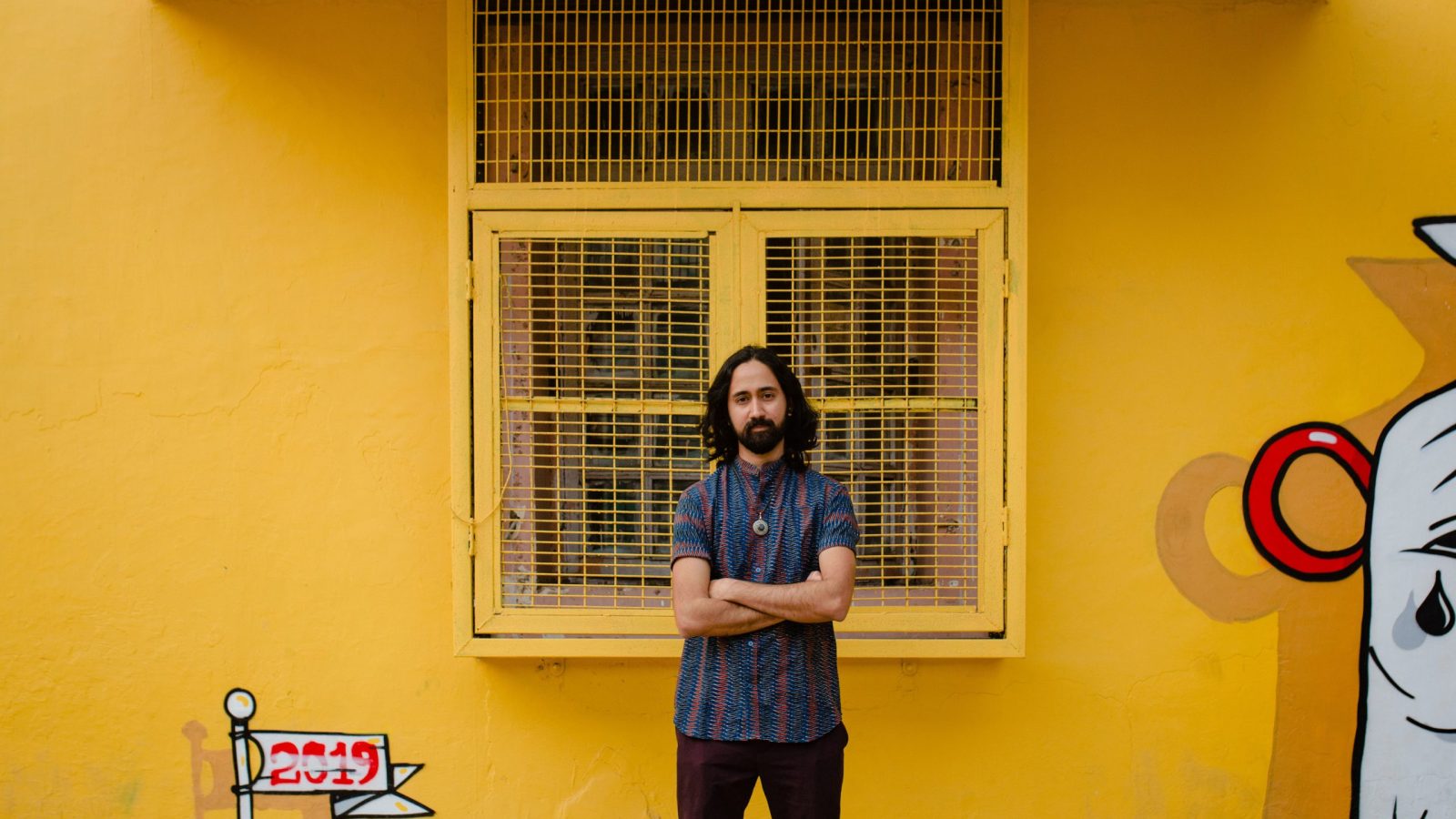With each of his projects to date, the percussionist, composer and bandleader Sarathy Korwar has shown creative ambition, cultural awareness, and above all, genuine empathy. A first generation immigrant: born in the US, raised in India and based in London, he has become a master of assimilation in more than one respect. In a musical sense, he has developed a deep understanding of jazz and Indian classical music as both a listener and performer, learning concurrently to respectfully blend those styles in a melting pot with hip-hop and electronica, without compromising the musicality or fundamental elements of any one source — becoming an adaptable musician and collaborator in the process. On a more personal level, he has adapted to London and made his working life there, broadcasting on Worldwide FM and becoming integral to the city’s clique of contemporary instrumentalists and improvised music makers, all the while furthering his understanding of politics and society — British and Indian — through his rich personal experience. All of this makes him one of the most interesting musicians in the UK today.
His forthcoming project, More Arriving, is the third of his albums to make an important statement about South Asian people and culture. His first, Day to Day, reflected the music and experience of the Sidi people (an ethnic group described as ‘largely misunderstood’ in a Quartz India article) blending field recordings with electronics and his accomplished tabla playing. Then, with My East is Your West, recorded live at London’s Church of Sound, he sought to redress the balance concerning jazz and Indian classical music in the many ‘fusion’ recordings of the sixties and seventies, doing their Indian passages true justice with properly tuned and beautifully executed instrumentation, while turning the tables and adding appropriate jazz instrumentation to rags and compositions in Indian styles, bringing the exchange full circle in a way that no other project seems to have before.
More Arriving again shows Sarathy’s understanding of culture, and empathy with the communities who drive it, finding him having collaborated with the predominantly working class MCs of India’s fast-developing, inter-city hip-hop movement. As Soumik Datta expressed in his recent Rhythms of India documentary, “Indian pop music never had its ‘punk’ moment, but in hip-hop, it’s witnessing a similar revolution.” Sarathy has recognised the political and musical importance of this, working collaboratively with Indian MCs and using his relative privilege with sensitivity and awareness, to craft a record of importance for all involved.
“I think I’ve always been keen to work with people I don’t know,” he confirms over the phone, “whether that meant with the first album, working with the Sidi community and for this album it meant working with MCs who I’ve hardly ever worked with. I don’t really have any background in hip-hop, other than being a fan. It was almost one of those things where music was just a really good opportunity to get to know somebody, you know, and to get to know a scene that I’m not part of. So, when it came to this album, talking about the growing hip-hop scene in India, I just wanted to get to know it a bit better, and one of the best ways to do that is to go and collaborate on an album… what’s refreshing about the scene there right now is that this is the first time that an independent music scene is being driven by predominantly working class kids, who come from working class backgrounds, rather than it being very sort of upper-middle class privilege… which is primarily what drives the rest of the independent music scene in India.”
The project began in November 2016, when Sarathy convened with some regular collaborators in London to record some musical sketches, which he could then take to India to begin developing the project. “Then followed a couple of years with lots of back and forth, lots of trips to India, recording stuff with MCs, coming back, working with some MCs here, working with an MC in Abu Dhabi,” he explains, “so [there are] a range of different brown voices basically on the record, South Asian voices. The idea quickly became about showcasing or featuring a diverse range of South Asian voices — people who’re going through different stuff wherever they live. To kind of drive home this idea that there is no one brown narrative, no one South Asian voice. I guess that’s something that I battle with living in the UK, people don’t see the difference between say, somebody like me, who’s a first generation immigrant, and somebody say whose great-grandfather moved here to Bradford, like fifty or sixty years ago. Very different kinds of realities but on the face of it, the same. So kind of driving home that point that it’s a very very nuanced, complex community… if it is a community at all. You could question whether there is any one south asian community, or whether there’s lots of disparate people.”
The record will be released on 26th July and adapted for the stage between now and September, when Sarathy brings it to Band on the Wall. Discussing how he will adapt this multi-layered project for a stage show, he suggests, “I think it’s got to be gig-friendly hasn’t it! Like most things in the age of austerity, it’s got to be like, a four or five piece band.” That band will likely feature Collocutor’s Tamar Osborn, whose baritone sax is a key element of Mumbay, plus a keys player, Sarathy on drums and percussion, and a selection of MCs.
“We’re definitely going to bring an MC or two over from India, but also tour with a British-Asian MC hopefully, so there’s that conversation about what it means to be British, but also what another South Asian voice sounds like, from further afield.” Sarathy suggests that, having trialled the performance dynamic in India, it is exciting him! “We did a couple of gigs actually: we did one a month ago in Delhi with a couple of the MCs who are on the record, and it was amazing! It worked really well that kind of sound. It felt big, and having two MCs on it was amazing.”
Sarathy Korwar performs live at Band on the Wall on 26th September 2019.




